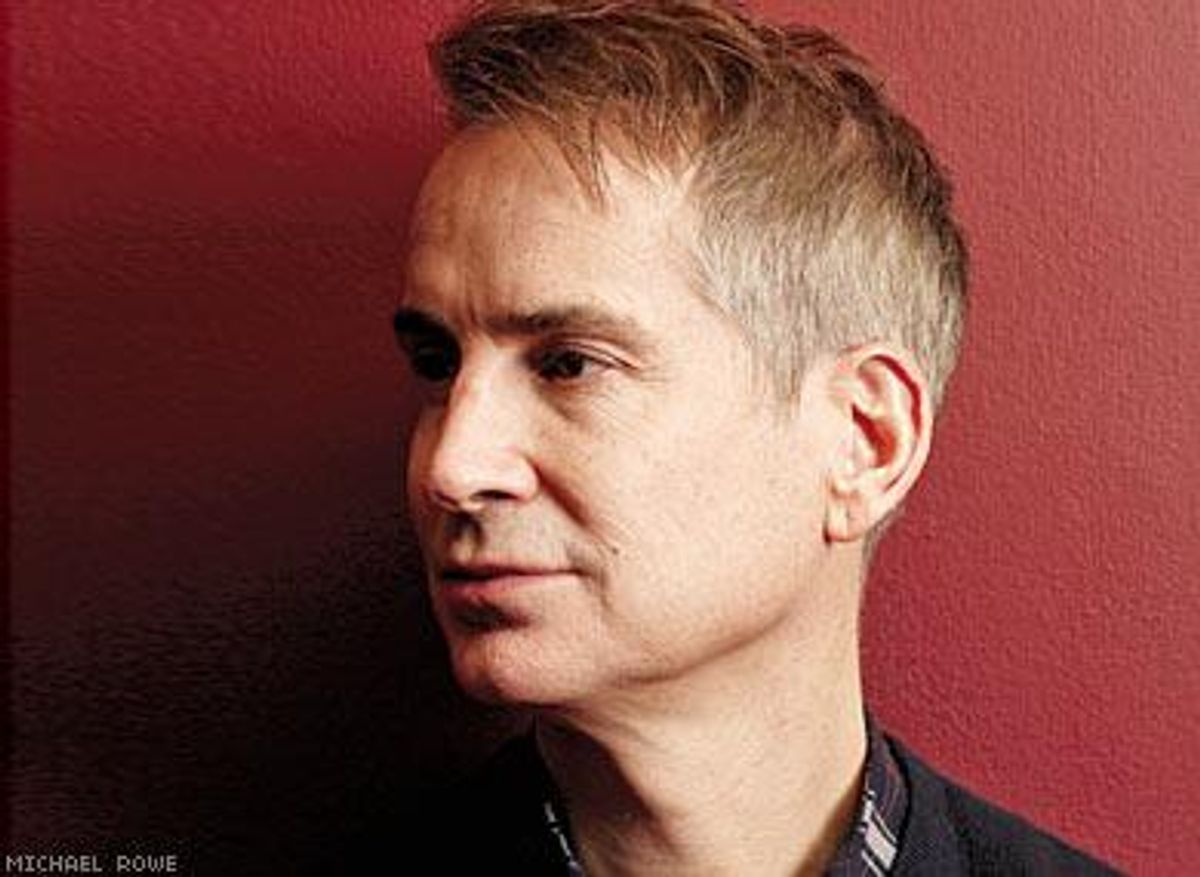
Agnostic playwright Geoffrey Nauffts hopes to convert the conservative masses with Next Fall, a new Broadway drama blessed by producer power couple Elton John and David Furnish.
April 09 2010 5:00 AM EST
November 17 2015 5:28 AM EST
By continuing to use our site, you agree to our Private Policy and Terms of Use.

Agnostic playwright Geoffrey Nauffts hopes to convert the conservative masses with Next Fall, a new Broadway drama blessed by producer power couple Elton John and David Furnish.
Geoffrey Nauffts is tired, hungry, and doesn't want to smile.
"When I smile it looks like I just let out a fart," he whines, self-consciously adjusting his Steven Alan shirt and lifting the hem of his slacks to reveal oddly cheerful orange socks. It's nothing short of a miracle that, despite a massive blizzard, he arrived safely in New York City this morning on a red-eye from Los Angeles, where he works as a staff writer on ABC's Brothers & Sisters. Sustained by Starbucks and gum, he's being photographed for this magazine on the mezzanine of the Helen Hayes Theater, home of his first full-length play, Next Fall.
Jet lag and low blood sugar notwithstanding, Nauffts should be smiling. Artistic director of prestigious nonprofit theater company Naked Angels since 2007 and a member for 23 years, the 49-year-old playwright saw Next Fall's sold-out off-Broadway run extended three times last summer. Directed by Sheryl Kaller, the critically acclaimed boy-meets-boy drama transferred to Broadway and opened March 11 with its original cast of six intact, including Patrick Breen as Adam, an atheist, and Gossip Girl alum Patrick Heusinger as Luke, Adam's younger fundamentalist Christian boyfriend. David Furnish and Elton John, with whom Nauffts is collaborating on the score for his musical film Showstopper, have even given the play their blessing and financial backing.
"Next Fall is a lot more than a gay love story," Nauffts says. He praises his play's universal appeal yet insists that no one attached to the production would dare shy away from its gay subject matter. "At the core it's an exploration of faith, but the fact that the couple at the center of our story is gay complicates the issue of belief even further. I just hesitate to label it a 'gay play' because I feel that might limit the audience. When you label something 'gay,' does that mean it's only for gay people? That would be a shame."
A decidedly neutral marketing campaign featuring autumn foliage ensures that Nauffts won't just be, as he puts it, "preaching to the choir." Once those proverbial straight butts are in the seats, however, he hopes that his show's political message makes an impact. "I'd like a wide range of people to come see this play, empathize with these characters, and start asking themselves questions," he says. "Ideally, it will inspire some movement and shifts in thinking."
In the context of one of his fictional couple's faith-inflamed spats, Nauffts questions whether Matthew Shepard's murderers, if they accept Jesus, are more likely to reach heaven than Shepard himself. The play also addresses issues of marriage equality and hospital visitation rights when Luke is in a life-threatening accident. "It sounds cliche, but when I first got into show business as an actor, I felt I could effect change through art by making people think and feel," says Nauffts, who is perhaps best known for his roles in The Commish and the Law & Order franchise. "Without being didactic or proselytizing, that's what I still try to do as a writer."
Nauffts, who considers himself agnostic, reasons that he has always been fascinated by the subject of religion in part because he was raised with no religious constraints in the "WASP-y, white Republican town" of Hudson, Ohio. "Without the sense of peace that religion can provide, I've floundered in times of despair because I felt I had nothing to cling to," he laments while describing the moment he misdiagnosed a bad case of mono in the early 1980s while attending New York University. "All my symptoms mimicked the symptoms of AIDS. I was just 18, a scared kid, and all I knew is that gay men were starting to die because of having sex. I had loving parents but felt a huge amount of shame, so I was convinced it was my punishment for being gay. Even without religion, I still feel some self-loathing as a gay man. You can't just wipe away years of being told you're not equal and not normal."
At the end of his long, exhausting day, Nauffts feels a communion of sorts with both of Next Fall's soul-crossed lovers. "I was thinking on the plane this morning about how I've always been a glass-half-empty kind of guy," he says, clinging to a half-full Starbucks cup, "but beneath the surface I do have an inherent belief in the goodness of people. That's what I've tried to depict with this play. Ultimately, whether they're believers or nonbelievers, all people are just grasping for grace."
Viral post saying Republicans 'have two daddies now' has MAGA hot and bothered